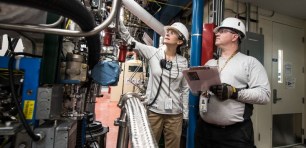
Source: The Creative Exchange/Unsplash.
Small and medium businesses in the $132.7 billion food and beverage manufacturing industry will be able to apply for cash grants of up to $25,000 from mid-January.
The federal government announced the grants on Wednesday as part of its $19.9 million Energy Efficient Communities Program that aims to boost the uptake of energy efficient technology and lower energy consumption among food and beverage manufacturing businesses.
To be eligible, SMEs must meet a range of requirements related to their business type and the project they want to fund.
For example, businesses must have between 1 and 199 employees, averaged over any consecutive 12 month period since July 1, 2019.
Businesses must also outline the project they are seeking to establish, including how it will lower the energy consumption of their operations.
These projects must be made up of at least $10,000 in expenses associated with energy audits, heating ventilation, air conditioning, process cooling or heating, waste management and other eligible costs. The full list of approved expenses is available at this website.
Applications for grants between $10,000 and $25,000 will open online on January 12 and close on February 18 next year.
Announcing the grants on Wednesday, Assistant Minister to the Minister for Industry, Energy and Emissions Reduction Tim Wilson said the funding will be split between states based on the proportion of businesses they have in the industry.
Wilson said the program will “cut power bills for businesses and create jobs directly in the sector as well as for local tradespeople”.
The peak body for Australian food and grocery manufacturers, however, has warned that the government needs to adopt a better approach to funding for the industry to become a high growth sector.
Tanya Barden, chief executive of the Australian Food and Grocery Council (AFGC) said government investment in the $132.7 billion food and grocery manufacturing industry has so far been disappointing.
“I would say that the sector has been disappointed,” Barden told a Senate inquiry into the state of Australian manufacturing on Wednesday.
“The pace at getting the dollars rolled out has been slower than anticipated and the level of funding coming forward has been lower than anticipated.”
The AFGC is calling for a more coordinated approach to investment in a bid to fund its vision to double the value of Australian food and grocery manufacturing to $250 billion by 2030.
The landmark report, Sustaining Australia: Food and Grocery Manufacturing 2030, sets out a path to help the industry overcome challenges, including a 50% rise in input costs over the past decade, in order to grow.
Handpicked for you

COVID has wreaked havoc on Aussie manufacturing. Here’s why supporting the SME sector will help



COMMENTS
SmartCompany is committed to hosting lively discussions. Help us keep the conversation useful, interesting and welcoming. We aim to publish comments quickly in the interest of promoting robust conversation, but we’re a small team and we deploy filters to protect against legal risk. Occasionally your comment may be held up while it is being reviewed, but we’re working as fast as we can to keep the conversation rolling.
The SmartCompany comment section is members-only content. Please subscribe to leave a comment.
The SmartCompany comment section is members-only content. Please login to leave a comment.